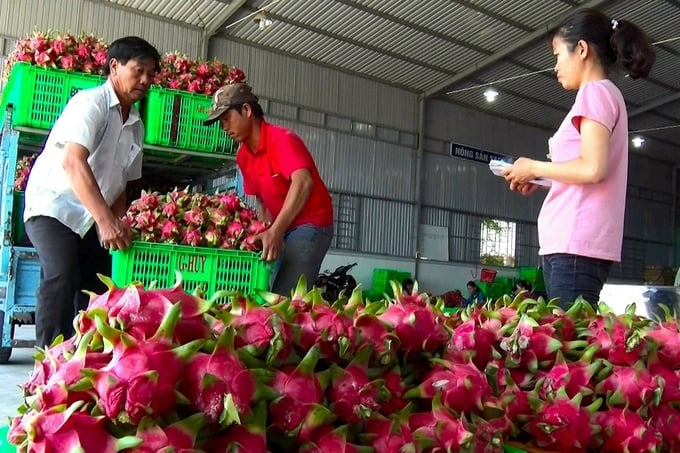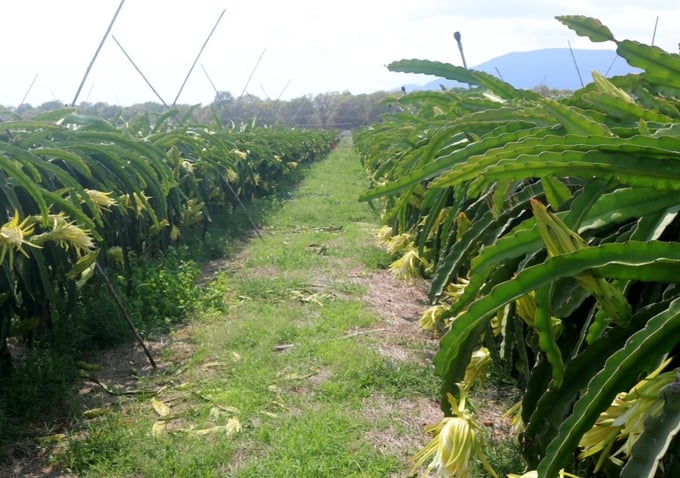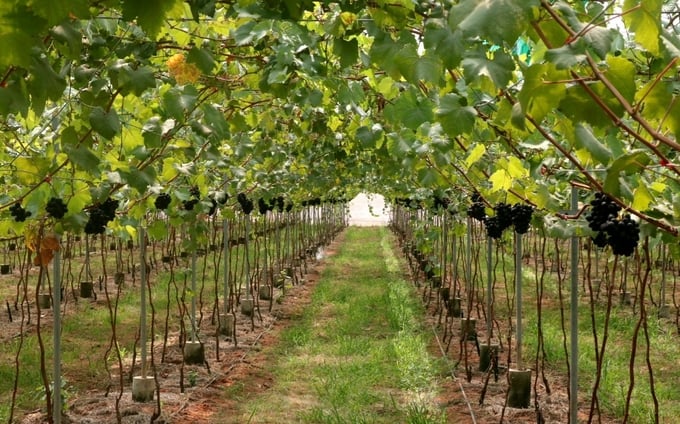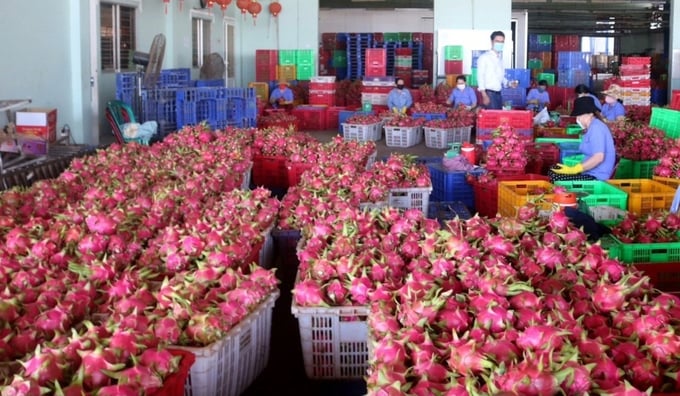November 26, 2025 | 05:55 GMT +7
November 26, 2025 | 05:55 GMT +7
Hotline: 0913.378.918
November 26, 2025 | 05:55 GMT +7
Hotline: 0913.378.918

Thuan Tien Dragon Fruit Cooperative, Ham Liem commune (Ham Thuan Bac district, Binh Thuan) purchases dragon fruit from its members. Photo: KS.
Established in 2016, Thuan Tien Dragon Fruit Cooperative (Ham Liem commune, Ham Thuan Bac district, Binh Thuan) includes 11 members, with 31 ha of dragon fruit.
Recently, the cooperative has produced safe dragon fruits according to VietGAP, GlobalGAP and organic standards with European certification, including more than 13 haof GlobalGAP dragon fruit, 10 ha of organic dragon fruit, and the rest is VietGAP dragon fruit. In addition, the cooperative also cooperates with outside members for the production of nearly 200 ha of VietGAP and GlobalGAP dragon fruits.
Tran Dinh Trung, Chairman of the Board of Directors of Thuan Tien Dragon Fruit Cooperative, said that currently the cooperative focuses on producing GlobalGAP dragon fruits because of its wide consumption. Each year the cooperative purchases about 300 tons of standard dragon fruits to export to demanding markets such as Europe, Australia, and the US. Currently, the cooperative has signed a contract with a partner to export dragon fruit to the European market at a stable price of VND 23,000/kg. For organic dragon fruit, the cooperative has had no export market in recent times, mainly serving for domestic consumption.

Recently, several businesses and cooperatives producing dragon fruit in Binh Thuan have boldly applied organic processes. Photo: KS.
“Organic dragon fruit is produced to ensure many strict standards and is strictly controlled in every stage of production. Production mainly uses biological products, so the product outlook is not as beautiful as conventionally produced dragon fruit", Mr Trung expressed. Also according to Mr. Trung, organic production is very difficult because it depends on climate and weather, so the products are often damaged. On average, 1 ha of organic dragon fruit produced by the cooperative only yields about 20 tons/year, about 30% lower than conventional production.
Due to the above difficulties, Thuan Tien Dragon Fruit Cooperative is currently hesitant about re-certifying organic dragon fruit, because production costs are high but output is limited.
According to Binh Thuan Department of Agriculture and Rural Development, the whole province has 6 production organizations including 1 cooperative, 4 companies, and 1 production household with a total area of 123 ha of dragon fruit and 4 ha of grapes that have been certified for organic agricultural products. In addition, there are 8 ha of medicinal plants that have been certified for organic agricultural products according to TCVN 11041-2:2017 standards.
Mr. Phan Van Tan, Deputy Director of Binh Thuan Department of Agriculture and Rural Development, said that organic agricultural production is a relatively new agricultural development direction, and production standards require strict compliance, so replication is currently difficult. However, the province's agricultural sector recognizes that organic agricultural production is extremely important in the current period.
Therefore, the Department has directed its affiliated units to coordinate closely with localities to propagate and guide organic farmers in association with consumption. Consequently, replicate the process through cooperatives and consumer businesses according to the Organic Agriculture Development Project in the province until 2030 approved by the Provincial People's Committee.

Binh Thuan province has 4 ha of grapes that have been certified organic. Photo: KS.
However, there are still few businesses associated with organic production cooperatives, especially businesses with chain models from production to product consumption. In addition, the investment capital to build facilities to serve production is relatively high for membrane house systems, net houses, automatic irrigation systems, electrical systems, and pre-processing houses... This is also partly difficult for small businesses and households with small and medium-sized production areas.
To remove existing problems and limitations to promote the development of organic agriculture in the province, in the coming time, the Binh Thuan agricultural sector will propagate, disseminate, guide and enforce policies, laws, and standards for organic agriculture and high-tech agriculture to create consumer trust, as well as raise awareness for businesses, producers and managers.
Along with that, the province will increase information output, propaganda, dissemination, and introduction so that people can access the results, development models and organic agricultural products, as well as high-tech agricultural applications.
Implement credit policies and incentive policies sufficiently; focus on training human resources for agriculture; identify areas with strong potential for producing organic agricultural products to encourage and attract businesses, cooperatives and people wishing to invest in production.
Continue to take advantage of central capital sources and mobilize provincial resources to invest in irrigation projects according to multi-purpose planning. Building an organic agriculture model based on value chain links from production - processing - consumption of products combined with rural tourism and ecological agriculture. Consequently, summarizing successful lessons for later training and transfer.

Binh Thuan's agricultural industry recognizes that organic agricultural production is extremely important in the current period. Photo: KS.
The agricultural sector will also perform well in input management of organic production; and management of plant varieties, livestock and aquatic products. At the same time, the sector will strengthen the output management of organic agricultural products. Products circulating on the market must be certified and have labels, origin traceability stamps, and product logos corresponding to certified standards.
Translated by Hoang Duy
/2025/11/25/0045-1-135246_13.jpg)
(VAN) Ca Mau is researching a model of sea-encroaching embankments combined with viaducts and logistics service zones, aiming both to prevent erosion and create land funds for marine economic development.

(VAN) The information was shared at the seminar 'Urban Agriculture - Solutions for Developing Green Spaces,' organized by the Kinh te & Do thi Newspaper and the Biotechnology Center of Ho Chi Minh City.
/2025/11/19/4141-2-132831_216.jpg)
(VAN) One of Japfa's outstanding solutions is implementing digital transformation and artificial intelligence (AI) to optimize operations, enhance productivity, and advance sustainable development.
/2025/11/19/4847-1-093540_448.jpg)
(VAN) The Gia Lai Provincial People’s Committee had a working session with the delegation of the U.S. Department of Agriculture, the State of Idaho, and representatives of the State's leading enterprises.

(VAN) Ca Mau has a sufficient foundation to become a strong regional aquaculture center, where production integrates the economy, the environment, and the lives of the people.

(VAN) SEIKI Group envisions itself as a pioneer in the ‘dual transformation’ of digital technology and green industry, standing alongside the Government and Vietnamese businesses in their pursuit of sustainable development.

(VAN) The VNGEONET network affirms Viet Nam's progress in mastering digital space, providing a precise positioning data platform to serve socioeconomic development.